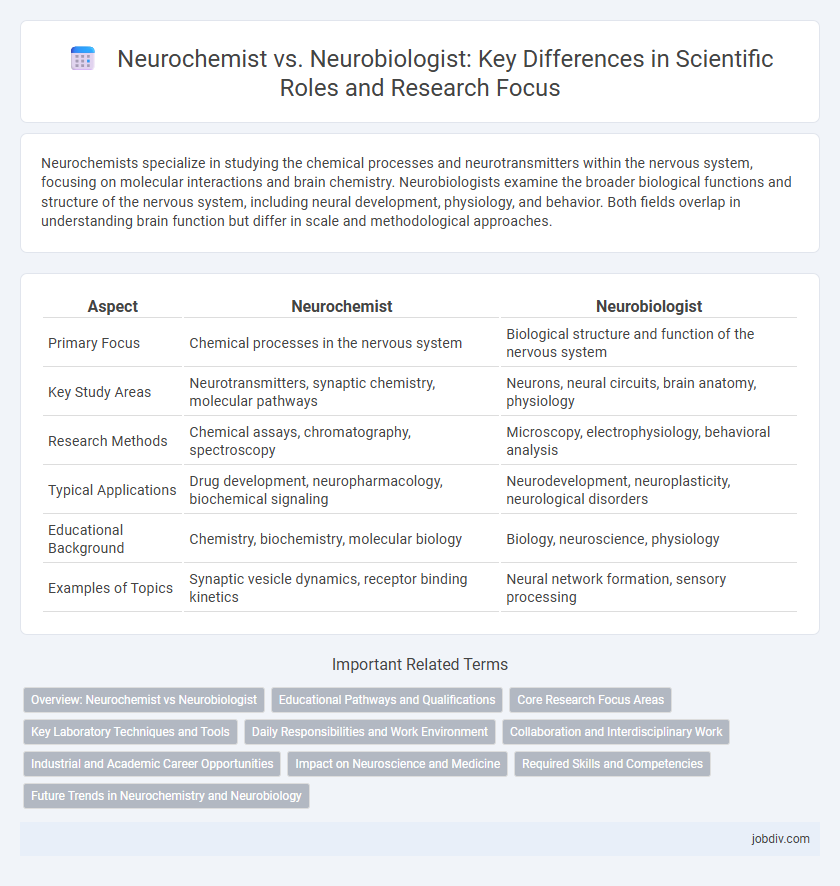Neurochemists specialize in studying the chemical processes and neurotransmitters within the nervous system, focusing on molecular interactions and brain chemistry. Neurobiologists examine the broader biological functions and structure of the nervous system, including neural development, physiology, and behavior. Both fields overlap in understanding brain function but differ in scale and methodological approaches.
Table of Comparison
| Aspect | Neurochemist | Neurobiologist |
|---|---|---|
| Primary Focus | Chemical processes in the nervous system | Biological structure and function of the nervous system |
| Key Study Areas | Neurotransmitters, synaptic chemistry, molecular pathways | Neurons, neural circuits, brain anatomy, physiology |
| Research Methods | Chemical assays, chromatography, spectroscopy | Microscopy, electrophysiology, behavioral analysis |
| Typical Applications | Drug development, neuropharmacology, biochemical signaling | Neurodevelopment, neuroplasticity, neurological disorders |
| Educational Background | Chemistry, biochemistry, molecular biology | Biology, neuroscience, physiology |
| Examples of Topics | Synaptic vesicle dynamics, receptor binding kinetics | Neural network formation, sensory processing |
Overview: Neurochemist vs Neurobiologist
Neurochemists study the chemical processes and neurotransmitter functions within the nervous system, emphasizing molecular interactions and biochemical pathways. Neurobiologists focus on the structural and functional aspects of the nervous system, exploring neural circuits, brain anatomy, and cellular mechanisms. Both fields intersect in understanding neural function but differ in their core methodologies and investigative focal points.
Educational Pathways and Qualifications
Neurochemists typically require advanced degrees in chemistry or biochemistry with specialized training in neurochemical processes, often completing a Ph.D. in neurochemistry or related fields. Neurobiologists pursue educational pathways rooted in biology, focusing on neuroscience or neurobiology, commonly earning a Ph.D. in biology with a specialization in nervous system function or neurophysiology. Both professions demand extensive postdoctoral research experience to develop expertise in cellular and molecular mechanisms underlying neural activity.
Core Research Focus Areas
Neurochemists primarily investigate the chemical processes and molecular interactions within the nervous system, emphasizing neurotransmitters, synaptic transmission, and neuropharmacology. Neurobiologists focus on the broader biological mechanisms of neural development, neuronal structure, and functional neural circuits. Both disciplines contribute to understanding brain function but differ in scale, with neurochemists targeting molecular pathways and neurobiologists exploring cellular and systemic neural biology.
Key Laboratory Techniques and Tools
Neurochemists primarily utilize techniques such as high-performance liquid chromatography (HPLC), mass spectrometry, and electrophoresis to analyze neurotransmitters and biochemical pathways in the nervous system. Neurobiologists frequently employ microscopy methods including confocal and electron microscopy, alongside molecular biology tools like PCR and gene sequencing to study cellular structures and genetic functions. Both disciplines rely heavily on imaging technologies but differ in their emphasis on chemical analysis versus cellular and genetic investigation.
Daily Responsibilities and Work Environment
Neurochemists analyze the chemical processes within neurons, often working in laboratory settings where they conduct experiments involving neurotransmitters and synaptic functions. Neurobiologists study the broader biological processes of the nervous system, focusing on cellular and systemic functions through in vivo and in vitro methods, frequently collaborating in research institutions or hospitals. Both professionals use advanced microscopy and electrophysiology techniques, but neurochemists primarily handle biochemical assays while neurobiologists monitor behavioral and physiological responses.
Collaboration and Interdisciplinary Work
Neurochemists and neurobiologists collaborate extensively to unravel the complexities of the nervous system, combining chemical analysis of neurotransmitters with the biological exploration of neural structures and functions. Their interdisciplinary work integrates molecular techniques, electrophysiological methods, and imaging technologies, advancing understanding of neurological diseases and brain function. Such synergy fosters innovative approaches in neuropharmacology, neurogenetics, and neural network mapping, accelerating translational research and therapeutic development.
Industrial and Academic Career Opportunities
Neurochemists specialize in studying the chemical processes within the nervous system, offering career opportunities in pharmaceutical companies and biotech firms focused on drug development and neurochemical analysis. Neurobiologists analyze the structure and function of the nervous system, with academic positions available in universities and research institutions conducting neurophysiological and behavioral studies. Both fields provide interdisciplinary roles in industrial research and academic settings, with neurochemists leaning more toward molecular and chemical applications, while neurobiologists emphasize organismal and systemic neuroscience.
Impact on Neuroscience and Medicine
Neurochemists analyze the chemical processes and neurotransmitter functions within the brain, providing critical insights into the molecular mechanisms underlying neurological disorders. Neurobiologists study the structure and function of neurons and neural circuits, enhancing understanding of brain development and neuroplasticity. Both disciplines significantly impact neuroscience and medicine by advancing targeted drug development and innovative therapeutic strategies for conditions such as Alzheimer's, Parkinson's, and depression.
Required Skills and Competencies
Neurochemists require advanced expertise in chemical analysis techniques, such as chromatography and spectroscopy, to study the molecular composition and biochemical processes of the nervous system. Neurobiologists must possess strong skills in cellular biology, electrophysiology, and neuroanatomy to investigate neural development, structure, and function across organisms. Both fields demand proficiency in data analysis, laboratory experimentation, and a solid understanding of neurophysiology and molecular biology principles.
Future Trends in Neurochemistry and Neurobiology
Emerging advancements in neurochemistry and neurobiology emphasize the integration of multi-omics approaches and neuroinformatics to unravel complex neural circuits and biochemical pathways. Cutting-edge techniques such as single-cell RNA sequencing and CRISPR gene editing are accelerating discoveries in synaptic plasticity and neurodegenerative disease mechanisms. Future trends highlight personalized neurotherapeutics and the convergence of artificial intelligence with neurobiological data to enhance brain disorder diagnostics and interventions.
Neurochemist vs Neurobiologist Infographic

 jobdiv.com
jobdiv.com